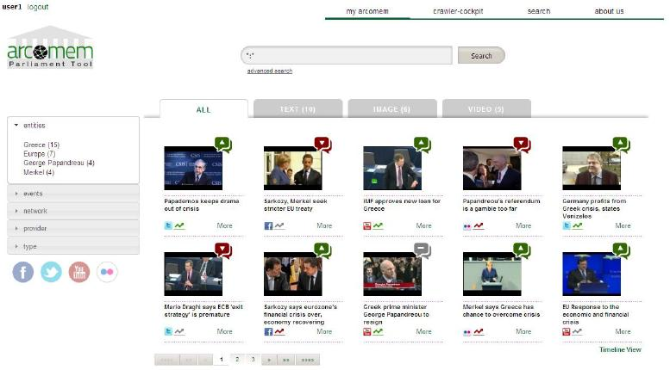1.
Introduction ^
Apart from the above, there is also a lot of meta-information that can be harvested and, if interpreted correctly, can present a very valuable and understandable view of how people respond to the stimuli. On the political domain, events like political announcements about economy, elections, draft laws and so on are of high importance and generate huge feedback in the social media. This paper presents how the ARCOMEM system1, a dedicated approach on social information analysis and preservation, may collect and analyze user feedback from social media in order to provide the researcher the necessary analytics to evaluate the opinion of the people on legislative issues.
2.
Motivation ^
Everything that happens in politics, may it be events, actions of people, or otherwise, could trigger long feedback from the societies that are affected. And the social web is the most fertile place for such discussions to take place. And it has become such an important medium that governments realize how much it means to be able to listen to the will of the people from the social web (Schefbeck et al., 2012). A recent example is the Finnish government’s amendment to the national constitution allowing the citizens to submit petitions to the Open Ministry2. This is a crowd sourcing platform for draft legislation that the government is obliged to examine before putting them to vote. The opinion of the citizens matters to the citizens themselves but also to their government and the social web – the place where the opinions are expressed.
3.
The ARCOMEM system ^
Generic input:
- Date/time, start and end of the crawl, frequency (schedule)
- Crawler selection
- Crawler specification, initial seed lists
Semantic level data input:
- Targeted entities (people, events, locations, geo-location, other)
- Targeted social networks
- Specific URLs and/or users from social media, languages
4.
Social feedback and content collection ^
The ARCOMEM system analysis, in the end, provides a semantic database that contains both the raw data that have been collected and the analyzed results in the form of RDF triples3. Using semantic queries and a specialized search and retrieval interface (Spiliotopoulos et al., 2012), the user may search for specific keywords (Figure 1).
The keywords may be either specific entities (such as politicians or ministers that are involved in the draft of a legislation) or free text that describes the domain (such as copyright law, digital media, movies, music, Europe, country_name). The results contain all web resources where the search parameters were retrieved for as well as the important semantic information. This information is:
- Entities and lists of related entities to the search
- Events and locations that were identified as relevant to the aforementioned entities
- Topics of discussions
- Collective opinions from social network users relevant to the search parameters
- Statistically significant data from the social web analysis, such as opinions of Twitter users on a person over a period of time
- Diverse texts from social networks
- Major users in terms of involvement as well as acceptance from the other users in the social networks and across social networks
5.
Conclusion ^
6.
Acknowledgements ^
7.
References ^
Schefbeck, G., Spiliotopoulos, D., Risse, T. (2012): The Recent Challenge in Web Archiving: Archiving the Social Web, International Council on Archives Congress, Brisbane, Australia, 20-24 August 2012.
Risse, T., Peters, W. (2012): ARCOMEM - From Collect-All ARchives to COmmunity MEMories.. In: World Wide Web Conference 2012 (WWW2012) - European Project Track, Lyon, France, April 2012
Spiliotopoulos, D., Tzoannos, E., Stavropoulou, P., Kouroupetroglou, D., Pino, A. (2012): Designing user interfaces for social media driven digital preservation and information retrieval, Lecture Notes in Computer Science, Volume 7382/2012, Computers Helping People with Special Needs, Springer-Verlag Berlin Heidelberg, pp. 581-584, 2012.
Dimitris Spiliotopoulos, Innovation Lab, Athens Technology Centre, Athens, GR.
Günther Schefbeck, Head of department, Austrian Parliamentary Administration, department «Parliamentary Documentation, Archives, and Statistics», Vienna, AT.
Dimitris Koryzis, Head of department, Hellenic Parliament, European Programs Implementation Service, Athens, GR.
- 1 ARCOMEM: Archive Communities Memories, http://www.arcomem.eu, FP7-ICT-270239.
- 2 Open Ministry, Finland, http://avoinministerio.fi.
- 3 http://en.wikipedia.org/wiki/Web_Ontology_Language






